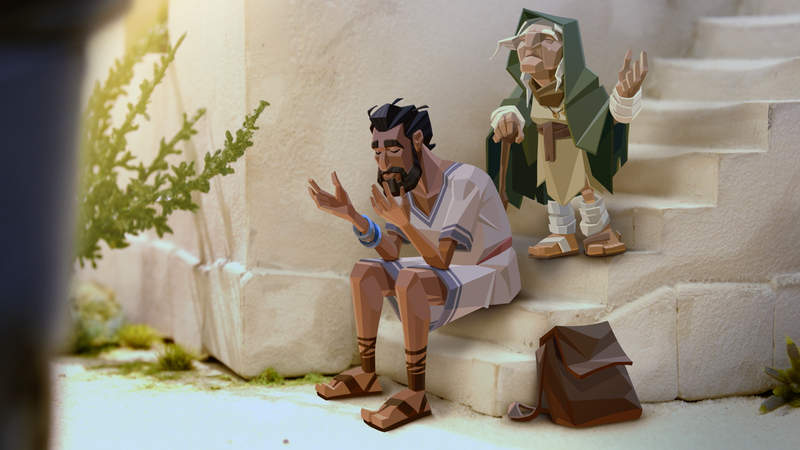Warnings About Religious Practices
About

Jesus of Nazareth, one of the most influential people in history, taught that the good life flows out of a right relationship with each other with the Creator of the universe. This is what it means to “do righteousness.” And as we receive and share God’s love, we gain the ultimate treasure of human existence.
In this guide, discover Jesus’ teaching about true righteousness in the context of religious practices, and explore related videos, podcast episodes, and more.
Context
Key Themes
- Right relating or righteousness
- Religious practices
- Hypocrisy
- Devotion to God
- Generosity to the poor
- Public versus private prayer
- Fasting
Structure
The Danger of Religious Hypocrisy
In Jesus’ day (and still today), people face temptation to perform religious acts like praying, fasting, and giving in order to gain social honor. Their efforts to relate to God are motivated by personal praise or being seen as holy or righteous. So Jesus teaches his followers about that temptation.
6 “Take care not to practice your righteousness in the sight of people, to be noticed by them; otherwise you have no reward with your Father who is in heaven.
These actions might resemble strong devotion to God, and they may even temporarily increase social status or applause. But they bring no lasting reward. Jesus describes this way of doing righteous deeds for social approval as the way of the hupokrites (Greek for “hypocrites”), which referred to actors on a stage. Jesus then focuses on three of the most popular ways to display righteousness before others: praying, fasting, and generous giving.

Generosity
Jesus begins with the example of generosity by saying:
2 “So when you give to the poor, do not sound a trumpet before you, as the hypocrites do in the synagogues and on the streets, so that they will be praised by people. Truly I say to you, they have their reward in full.
In Jesus’ culture, public displays of generosity were a way to celebrate God’s generous love, but they could also become a way to promote oneself. So Jesus offers an alternative.
3 But when you give to the poor, do not let your left hand know what your right hand is doing,
Giving in ways that others cannot see is a foolproof way to ensure your generosity is motivated by love. But Jesus also taught earlier, in the same sermon, that people should not hide their light and good works, letting them shine as an example for others.
14 “You are the light of the world. A city set on a hill cannot be hidden; 15 nor do people light a lamp and put it under a basket, but on the lampstand, and it gives light to all who are in the house. 16 Your light must shine before people in such a way that they may see your good works, and glorify your Father who is in heaven.
So which one does Jesus want us to follow? Both of these behaviors have their place in the good life. And Jesus isn’t offering black and white rules—he’s offering wisdom. It’s our job to discern when to let our good works be seen and when to keep them hidden. All of our actions should be motivated by a desire to bless and care for others. It is then that we will display the real heartbeat of God’s love.

17 As He was setting out on a journey, a man ran up to Him and knelt before Him, and asked Him, “Good Teacher, what shall I do so that I may inherit eternal life?” 18 But Jesus said to him, “Why do you call Me good? No one is good except God alone. 19 You know the commandments: ‘Do not murder, Do not commit adultery, Do not steal, Do not give false testimony, Do not defraud, Honor your father and mother.’” 20 And he said to Him, “Teacher, I have kept all these things from my youth.” 21 Looking at him, Jesus showed love to him and said to him, “One thing you lack: go and sell all you possess and give to the poor, and you will have treasure in heaven; and come, follow Me.” 22 But he was deeply dismayed by these words, and he went away grieving; for he was one who owned much property.
41 And Jesus sat down opposite the treasury, and began watching how the people were putting money into the treasury; and many rich people were putting in large amounts. 42 And a poor widow came and put in two lepta coins, which amount to a quadrans. 43 Calling His disciples to Him, He said to them, “Truly I say to you, this poor widow put in more than all the contributors to the treasury; 44 for they all put in out of their surplus, but she, out of her poverty, put in all she owned, all she had to live on.”
44 “The kingdom of heaven is like a treasure hidden in the field, which a man found and hid again; and from joy over it he goes and sells everything that he has, and buys that field.
13 Now someone in the crowd said to Him, “Teacher, tell my brother to divide the family inheritance with me.” 14 But He said to him, “You there— who appointed Me a judge or arbitrator over the two of you?” 15 But He said to them, “Beware, and be on your guard against every form of greed; for not even when one is affluent does his life consist of his possessions.” 16 And He told them a parable, saying, “The land of a rich man was very productive. 17 And he began thinking to himself, saying, ‘What shall I do, since I have no place to store my crops?’ 18 And he said, ‘This is what I will do: I will tear down my barns and build larger ones, and I will store all my grain and my goods there. 19 And I will say to myself, “You have many goods stored up for many years to come; relax, eat, drink, and enjoy yourself!”’ 20 But God said to him, ‘You fool! This very night your soul is demanded of you; and as for all that you have prepared, who will own it now?’ 21 Such is the one who stores up treasure for himself, and is not rich in relation to God.”
33 “Sell your possessions and give to charity; make yourselves money belts that do not wear out, an inexhaustible treasure in heaven, where no thief comes near nor does a moth destroy.
35 In everything I showed you that by working hard in this way you must help the weak and remember the words of the Lord Jesus, that He Himself said, ‘It is more blessed to give than to receive.’”
In light of all of these encouragements to live with generosity, Jesus still challenges us to be careful and honest with ourselves. If there’s even a hint of desire for others to see how much we are giving, or whom we’re giving to, it’s probably wise for us to give in secret.
It may be easier if Jesus gave one clear rule. But by giving us this wisdom, Jesus invites us to cultivate a closer relationship with God, trusting that as we learn to operate in his ways with real love for our neighbors, we will know when it is helpful to give in private or more publicly.
Prayer
In his second case study, Jesus makes the same point about praying in public versus praying in private.
5 “And when you pray, you are not to be like the hypocrites; for they love to stand and pray in the synagogues and on the street corners so that they will be seen by people. Truly I say to you, they have their reward in full.
In Jesus’ culture, people traditionally prayed the Shema from the Torah every sunrise and sunset. Jesus was also known for his consistent devotion to prayer. However, he never prayed publicly in order to promote himself. Be careful, he says, because even your prayer habits can become a strategy for gaining public favor.
Imagine the temptation to “conveniently” find yourself on a busy street corner when prayer time comes—the perfect moment to show lots of people how serious you are about following God. People may be impressed, seeing your devotion and faithfulness. And if that’s what you’re after, you’ll probably get it! But that’s really all you get. Jesus says there’s a better, more-lasting reward.
6 But as for you, when you pray, go into your inner room, close your door, and pray to your Father who is in secret; and your Father who sees what is done in secret will reward you.
Prayer is about spending time with and turning our attention to God. In prayer, we share thoughts and concerns with God, trusting that he always hears and responds in ways that work for our good. One good way to check our motives is to pray when no one can see or hear. But again, this isn’t a static rule but one part of a deeper wisdom. Jesus prayed alone often and also with his followers and in front of large public audiences. Both are important ways of connecting to God, but neither should be done out of motivation for self-promotion.

Fasting
The third case study is focused on fasting.
16 “Now whenever you fast, do not make a gloomy face as the hypocrites do, for they distort their faces so that they will be noticed by people when they are fasting. Truly I say to you, they have their reward in full.
Fasting is the practice of intentionally refraining from food, drink, or certain actions while inviting God to meet us and sustain us. Fasting is kind of like praying with our bodies, and it’s intended to foster stronger bonds of trust with God. But even fasting can be used as a performance. So Jesus once again advises people to be honest about their motives. He even tells them to clean themselves up while they’re fasting, so they avoid any attempt to garner people’s sympathy by looking exhausted or pained:
17 But as for you, when you fast, anoint your head and wash your face, 18 so that your fasting will not be noticed by people but by your Father who is in secret; and your Father who sees what is done in secret will reward you.
Notice that in all three cases, Jesus does not say people should ditch these practices. Instead, he encourages everyone to find creative ways to express devotion so that they don’t treat their love for God like a trophy. Jesus knows his followers will be most effective in the world when they care the least about social status and the most about following in the way of God’s generous love.
